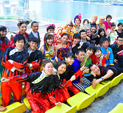Participate |
|
|
Table of Contents
Post your Videos
Please join us on our YouTube Channel by sharing videos abouth the International Year of Youth (IYY). In order to share your video, just send the video’s URL to us and we will do our best to post it. The subject of your email should be "IYY Video Sharing".
Post your Photos
Please join us on our Picassa Photo Gallery by sharing photos about the International Year of Youth (IYY). In order to share your photos, please send us an emailand we will do our best to post them. The subject of your email should be "IYY Photo Sharing". |
 Are you a young person and a global citizen? The progress achieved during this Year in each of these areas will lay the foundation for further work in youth development, including the implementation of the World Programme of Action for Youth and the achievement of the Millennium Development Goals.
Organize and implement activities for the International Year of Youth To download our promotional materials for your activities celebrating the Year, please visit: http://social.un.org/youthyear/promote.html
The International Years are customarily celebrated at the national level, steered by a National Committee. We encourage governments to form National Committee in partnership with civil society and UN system organizations within the country. To find out more about what a National Committee is and how the composition might look like, please read our guidelines. Once a National Committee is formed in your country, please inform the UN Programme on Youth of the contact person and plans for the year so that we can add your activities and/or events to the calendar. (Fax +1-212-963-0111) or email youth@un.org
What do youth expect from non-formal education? For this month's consultation we have decided to join forces with the WAGGGS and have a look at the difference between formal and non-formal education and to hear from YOUth how they feel about it.
According to UNESCO's definitions, formal education is the hierarchically structured, chronologically graded, educational system running from primary through to tertiary institutions.On the other hand, non-formal education is organised educational activity outside the established formal system that is intended to serve an identifiable learning clientele with identifiable learning objectives.
Formal education is the education we receive through schools, while non-formal education happens mostly outside school, for example in youth clubs and youth groups. Both forms of education complement each other and they are both part of a holistic approach to education. What do you expect from non-formal education? What topics would you prefer to discuss in a non-formal environment? Why? Have you ever taken part in non-formal education activities? What did you find positive/negative about it? Deadline for submissions :July 6th 2011.
Suggest low cost activities for the International Year of Youth! To suggest a low cost activitiy, visit our facebook page at http://www.facebook.com/UNyouthyear today! Please continue to spread the word about the International Year and the consultation on low cost activities to your friends and among your networks.
We look forward to you joining us. Please visit our Facebook page: http://www.facebook.com/UNyouthyear
|
Welcome to the United Nations. It's your world.














